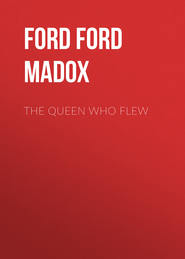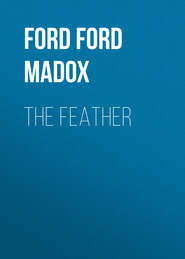По всем вопросам обращайтесь на: info@litportal.ru
(©) 2003-2024.
✖
Privy Seal: His Last Venture
Настройки чтения
Размер шрифта
Высота строк
Поля
Nevertheless it blew cold, and he borrowed a cloak and a pottle of sack to warm the young Poins, who had run with him capless and without a coat. For, listening to the boy's disjointed tale out in the broad reaches below London, Throckmorton recognised that if the young man were incredibly a fool he was incredibly steadfast too, and a steadfast fool is a good tool to retain for simple work. He had, too – the boy – a valuable hatred for Culpepper that he allowed to transfer itself to Katharine herself: a brooding hatred that hung in his blue eyes as he gazed downwards at the barge floor or spat at the planks of the side. Its ferocity was augmented by the patches of plaster that stretched over his skull and dropped over one blonde eyebrow.
'Cod!' he ejaculated. 'Cod! Cod! Cod!' and waved a fist ferociously at the rushes that spiked the waters of the river in their new green. 'They waited till I was too sick of the sickness of the sea, too sick to stand – more mortal sick than ever man was. I hung to a rope and might not let go. And Cod! Cod! Cod! Culpepper lay under the sterncastle in a hole and set his Lincolnshire beast to baste my ribs.'
He spat again with gloomy quiescence into the bottom of the boat.
'In the mid of the sea,' he said, 'where the ship pointed at heaven and then at the fiend his home, I hung to a rope and was basted! And that whore's son lay in his hole and laughed. For I was a cub, says he, and not fit for a man's converse or striking.'
Throckmorton's eyes glimmered a little.
'You have been used as befits no gentleman's son,' he said. 'I will see to the righting of your wrongs.'
Poins swore with an amazing obscenity.
'Shall right 'em myself,' he said, 'so I meet T. Culpepper in this flesh as a man.'
Throckmorton leaned gently forward and touched his arm.
'I will right thy wrongs,' he said, 'and see to thine advancement; for if in this service you ha' failed, yet ha' you been persistent and feal.' He dabbled one white hand in the water, 'Nevertheless,' he said slowly, 'I would have you consider that your service in this ends here.' He spoke still more slowly: 'I would have you to understand this. Aforetime I gave you certain instructions as to using your sword upon this Culpepper if you might not otherwise stay him.' He held up one finger. 'Now mark; your commission is ceased. You shall no longer for my service draw sword, knife or dagger, stave nor club, upon this man.'
Poins looked at him with gloomy surprise that was changing swiftly to hot rage.
'I am under oath to a certain one to use no violence upon this man,' Throckmorton said, 'and to encourage no other to do violence.'
Poins thrust his round, brick-red brow out like a turkey cock's from the boat cloak into Throckmorton's face.
'I am under no oath of yourn!' he shouted. Throckmorton shrugged his shoulders and wagged one finger at him. 'No oath o' yourn!' the boy repeated. 'God knows who ye be or why it is so. But I ha' heard ye ha' my neck in a noose; I ha' heard ye be dangerous. Yet, before God, I swear in your teeth that if I meet this man to his face, or come upon his filthy back, drunk, awake, asleep, I will run him through the belly and send his soul to hell. He had me, a gentleman's son, basted by a hind!'
This long speech exhausted his breath, and he fell back panting.
'I had as soon ye had my head as not,' he muttered desperately, 'since I have been basted.'
'Why,' Throckmorton answered, 'for your private troubles, I know naught of them. There may be some that will thank ye or advance ye for spitting of this gallant. But I am not one of them. Nevertheless will I be your friend, whom ye would have served better an ye could.'
He smiled in his inward manner and went to polishing of his nails. A little later he felt the bruises on the boy's arms, and stayed the barge for a moment the stage where, swiftly, eight oarsmen took the places of the eight that had rowed two shifts out of three – stayed the barge for time enough to purchase for the boy a ham, a little ginger, some raw eggs and sack.
The barge rushed forward, with the jar of oars and the sound, like satin tearing, of the water at the bows, across the ruffled reaches of the broad waters. The gilded roofs, the gabled fronts of the palace at Greenwich called Placentia, winked in the fresh sunlight. Throckmorton had a great fever of excitement, but having sworn to let his oarsmen be scourged with leathern thongs if they made no more efforts, he lay back upon the purple cushions and toyed with the strings of the yellow ensign that floated behind them. It was his purpose to put heart in the boy and to feed his rage, so that alternately he promised to give him the warding of the Queen's door – a notable advancement – or assented to the lad's gloom when he said that he was fit only for the stables, having been beaten by a groom. So that at the quay the boy sprang forth mightily, swaying the boat behind him. The trace of his sea-sickness had left him; he swore to tear Culpepper's throat apart as if it had been capon flesh.
Throckmorton swiftly quartered the gardens, sending, in his passage beneath the tall palace arch, a dozen men to search all the paths for any drunkards that might there lie hidden. He sent the young Poins to search the three alehouses of the village where seamen new landed sat to drink. But, having found the sergeant of void palaces asleep in a small cell at the house end, he learned that two men, speaking Lincolnshire, had been there two hours agone, questing for Master Viridus and swearing that they had rid France of the devil and were to be made great lords for it. The sergeant, an old, corpulent Spaniard who had been in England forty years, having come with the dead Queen Katharine and been given this honourable post because the queen had loved him, folded his fat hands across his round stomach as he sat on the floor, his legs stretched out, his head against the hangings.
'I might not make out if they were lords or what manner of cavaliers,' he said. 'They sought some woman whom they would not name, and ran through a score of empty rooms. God knows whither they went.'
He pulled his nightcap further over his head, nodded at Throckmorton, and resumed his meditations.
There was no finding them in the still and empty corridors of the palace; but at the gateway he heard that the two men had clamoured to know where they might purchase raw shinbone of beef, and had been directed to the house of a widow Emden. There Throckmorton found their tracks, for the sacking that covered the window-holes was burst outwards, beef-bones lay on the road before the door, and, within, the widow, black, begrimed and very drunk, lay inverted on the clay of the floor, her head beneath the three legs of the chopping block, so that she was as if in a pillory, but too fuddled to do more than wave her legs. A prentice who crouched, with a broken head, in a corner of the filthy room, said that a man from Lincolnshire, all in Lincoln green, with a red beard, had wrought this ruin of beef-bones that he had cast through the windows, and had then comforted the screaming widow with much strong drink from a black bottle. They had wanted raw beef to make them valiant against some wedding, and they threw the beef-bones through the sacking because they said the place stunk villainously. They seemed, these two, to have visited every hovel in the damp and squalid village that lay before the palace gates. They had kicked beds of straw over the floors, thrown crocks at the pigs, melted pewter plates in the fires.
For pure joy at being afoot and ashore in England again, they had cast coins into all the houses and hovels of mud; they had brought out cans and casks from the alehouses, and cast pies into the streets, and caused the dismal ward to cry out: 'God save free Englishmen!' 'Curse the sea!' and 'A plague of Frenchmen that be devils!'
And the after effects of their carnival menaced Throckmorton, for from the miserable huts, where ragged women were rearranging the scattered straws and wiping egg-yolk from the broken benches, there issued a ragged crowd of men with tangled and muddy hair and boys unclothed save for sacks that whistled about their lean hips. The liquor that Culpepper and Hogben had distributed had rendered them curious or full of mutiny and discontent, and they surrounded Throckmorton's brilliant figure in its purple velvet, with the gold neck-chains and the jewelled hat, and some of them asked for money, and some called him 'Frenchman,' and some knew him for a spy, and some caught up stones and jawbones furtively to cast at him.
But, arrogant and with his head set high, he borrowed a whip from a packman that shouldered his way through the street, and lashed at their legs and ragged heads. The crowd slunk, one by one, back under the darkness that was beneath the roofs of reeds, and the idea of a good day that for a moment had risen in their minds at Culpepper's legendary approach, sank down and flickered out once more in their hungry bellies and fever-dimmed minds.
'God!' he said, 'we will have hangmen here,' and pursued his search. He met the young Poins at the head of the village street, and learned from him that Culpepper and his supporter had hired horses to ride to Hampton and had galloped away three hours before, holding legs of mutton by the feet and using them for cudgels to beat their horses.
'Before God!' the boy said, 'an I had money to hire horses I would overtake them, if I overtook not the devil erstwhile.'
Throckmorton pulled out his purple purse that was embroidered with silk crosses. He extracted from it four crowns of gold.
'Lad,' he said, 'I do not give thee gold to follow Kat Howard's cousin with. This is thy wage for the service thou hast done aforetime.' He reflected for a moment. 'If thou wilt have a horse – but I urge it not – to go to Hampton where thy fellows of the guard are – for, having served well ye may once more and without danger rejoin your mates – if ye will have such a horse, go to the horseward of the palace and say I sent you. Withouten doubt ye are mad to hasten back to your mates, a commendable desire. And the King's horses shall hasten faster than any hired horse – so that ye may easily overtake a man that hath but two hours' start towards Hampton.'
Whilst Poins was already hastening towards the gateway, Throckmorton cried to him at a distance:
'Ask at each cross-road guard-house and at all ferries and bridges if some have passed that way; and at the landing-stage if perchance caballeros have altered their desires and had it in their minds to take to boats.'
He sped through the wind to the riverside, set again his oars in motion and swept up the tide. It had turned and they made good progress.
VI
The Queen sat in her painted gallery at Richmond, and all around her her maids sewed and span. The gallery was long; along the panels that faced the windows were angels painted in red and blue and gold, and in the three centre squares St. George, whose face was the face of the King's Highness, in one issued from a yellow city upon a green plain; in one with a cherry-coloured lance slew a green dragon from whose mouth issued orange-coloured flames; and in one carried away, that he might wed her in a rose-coloured tower on a hillside, a princess in a black gown with hair painted of real gold.
Whilst the maids sewed in silence the Queen sat still upon a stool. Light-skinned, not very stout, with a smooth oval face, she had laid her folded hands on the gold and pearl embroidery of her lap and gazed away into the distance, thinking. She sat so still that not even the lawn tips of her wide hood with its invisible, minute sewings of white, quivered. Her gown was of cloth of gold, but since her being in England she had learned to wear a train, and in its folds on the ground slept a small Italian greyhound. About her neck she had a partelet set with green jewels and with pearls. Her maids sewed; the spinning-wheels ate away the braided flax from the spindles, and the sunlight poured down through the high windows. She was a very fair woman then, and many that had seen her there sit had marvelled of the King's disfavour for her; but she was accounted wondrous still, sitting thus by the hour with the little hounds in the folds of her dress. Only her eyes with their half-closed lids gave to her lost gaze the appearance of a humour and irony that she never was heard to voice.
They turned to the opening door, a flush came into her face, spread slowly down her white neck and was lost in the white opening of her shoulder-pieces, and she greeted Katharine Howard, kneeling at her feet, with an inclination of the head so tiny that you could not see the motion. Her eyes remained motionlessly upon the girl's face; only the lids moved suddenly when Katharine spoke to her in German.
'You speak my tongue?' the Queen asked, motionless still and speaking very low. Katharine remained upon her knees.
'I learned to read books in German when I was a child,' Katharine said; 'and since you came I have spoken an hour a day with a German astronomer that I might give you pleasure if so be it chanced.'
'So it is well,' the Queen said. 'Not many have so done.'
'God has endowed me with an ease of tongues,' Katharine answered; 'many others would have ventured it for your Grace's pleasure. But your tongue is a hard tongue.'
'I have needed to learn hard sentences in yours,' the Queen said, 'and have had many masters many hours of the day. I will have you stand up upon your feet.'
Katharine remained upon her knees.
'I will have you stand up upon your feet,' the Queen repeated.
'I have a prayer to make,' Katharine answered.
The Queen looked for a minute straight before her, then slowly turned her head to one side. When her gaze rested upon her women they rose and, with a clatter of their feet and a rustle of garments, carrying their white sewings and their spinning-wheels stilled, went away down the gallery. The German lord of Overstein, bearded and immense in the then German fashion, came from behind the retreating women to stand before the Queen signifying that he would offer his interpretership. She dismissed him without speaking, letting her eyes rest upon him. She was the most silent woman in the world, but all people said that no queen had women and men servers that needed fewer words or so discreetly did their devoirs.
The silence and the bright light of the sun swathed these two women's figures, so that Katharine seemed to hear the flutter against the window-glass of a brown butterfly that, having sheltered in the hall all winter, now sought to take a part in the new brightness of the world. Katharine kept her knees, her eyes upon the floor; the Queen, motionless and soft, let her eyes rest upon Katharine's hood. From time to time they travelled to her face, to the medallion that hung from her neck, and to her dark green skirt of velvet that lay around her upon the floor. The butterfly sought another window; the Queen spoke at last.
'You seek my queenship'; and in her still voice there was neither passion, nor pity, nor question, nor resignation.
Katharine raised her eyes: they saw the imprisoned butterfly, but she found no words.
'You have more courage than I,' the Queen said.












